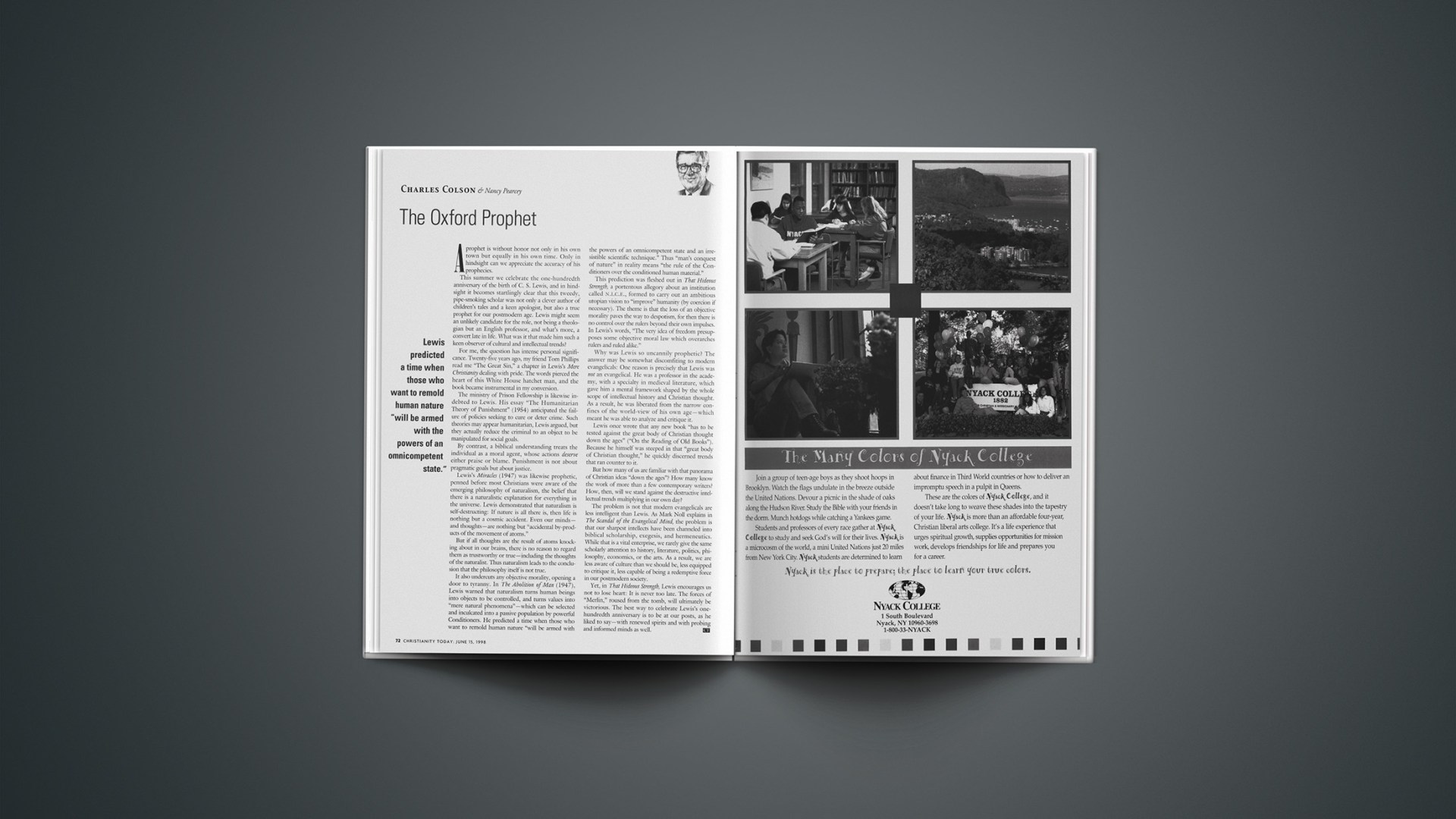A prophet is without honor not only in his own town but equally in his own time. Only in hindsight can we appreciate the accuracy of his prophecies.
This summer we celebrate the one-hundredth anniversary of the birth of C. S. Lewis, and in hindsight it becomes startlingly clear that this tweedy, pipe-smoking scholar was not only a clever author of children’s tales and a keen apologist, but also a true prophet for our postmodern age. Lewis might seem an unlikely candidate for the role, not being a theologian but an English professor, and what’s more, a convert late in life. What was it that made him such a keen observer of cultural and intellectual trends?
For me, the question has intense personal significance. Twenty-five years ago, my friend Tom Phillips read me “The Great Sin,” a chapter in Lewis’s Mere Christianity dealing with pride. The words pierced the heart of this White House hatchet man, and the book became instrumental in my conversion.
The ministry of Prison Fellowship is likewise indebted to Lewis. His essay “The Humanitarian Theory of Punishment” (1954) anticipated the failure of policies seeking to cure or deter crime. Such theories may appear humanitarian, Lewis argued, but they actually reduce the criminal to an object to be manipulated for social goals.
By contrast, a biblical understanding treats the individual as a moral agent, whose actions deserve either praise or blame. Punishment is not about pragmatic goals but about justice.
Lewis’s Miracles (1947) was likewise prophetic, penned before most Christians were aware of the emerging philosophy of naturalism, the belief that there is a naturalistic explanation for everything in the universe. Lewis demonstrated that naturalism is self-destructing: If nature is all there is, then life is nothing but a cosmic accident. Even our minds—and thoughts—are nothing but “accidental by-products of the movement of atoms.”
But if all thoughts are the result of atoms knocking about in our brains, there is no reason to regard them as trustworthy or true—including the thoughts of the naturalist. Thus naturalism leads to the conclusion that the philosophy itself is not true.
It also undercuts any objective morality, opening a door to tyranny. In The Abolition of Man (1947), Lewis warned that naturalism turns human beings into objects to be controlled, and turns values into “mere natural phenomena”—which can be selected and inculcated into a passive population by powerful Conditioners. He predicted a time when those who want to remold human nature “will be armed with the powers of an omnicompetent state and an irresistible scientific technique.” Thus “man’s conquest of nature” in reality means “the rule of the Conditioners over the conditioned human material.”
This prediction was fleshed out in That Hideous Strength, a portentous allegory about an institution called n.i.c.e., formed to carry out an ambitious utopian vision to “improve” humanity (by coercion if necessary). The theme is that the loss of an objective morality paves the way to despotism, for then there is no control over the rulers beyond their own impulses. In Lewis’s words, “The very idea of freedom presupposes some objective moral law which overarches rulers and ruled alike.”
Why was Lewis so uncannily prophetic? The answer may be somewhat discomfiting to modern evangelicals: One reason is precisely that Lewis was not an evangelical. He was a professor in the academy, with a specialty in medieval literature, which gave him a mental framework shaped by the whole scope of intellectual history and Christian thought. As a result, he was liberated from the narrow confines of the world-view of his own age—which meant he was able to analyze and critique it.
Lewis once wrote that any new book “has to be tested against the great body of Christian thought down the ages” (“On the Reading of Old Books”). Because he himself was steeped in that “great body of Christian thought,” he quickly discerned trends that ran counter to it.
But how many of us are familiar with that panorama of Christian ideas “down the ages”? How many know the work of more than a few contemporary writers? How, then, will we stand against the destructive intellectual trends multiplying in our own day?
The problem is not that modern evangelicals are less intelligent than Lewis. As Mark Noll explains in The Scandal of the Evangelical Mind, the problem is that our sharpest intellects have been channeled into biblical scholarship, exegesis, and hermeneutics. While that is a vital enterprise, we rarely give the same scholarly attention to history, literature, politics, philosophy, economics, or the arts. As a result, we are less aware of culture than we should be, less equipped to critique it, less capable of being a redemptive force in our postmodern society.
Yet, in That Hideous Strength, Lewis encourages us not to lose heart: It is never too late. The forces of “Merlin,” roused from the tomb, will ultimately be victorious. The best way to celebrate Lewis’s one-hundredth anniversary is to be at our posts, as he liked to say—with renewed spirits and with probing and informed minds as well.
Copyright © 1998 Christianity Today. Click for reprint information.










